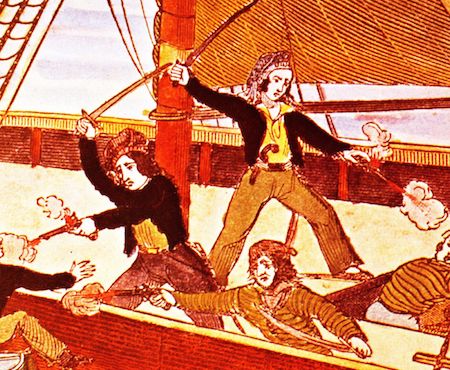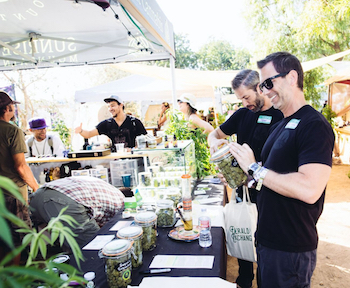Anne Bonny is literally the most notorious woman pirate ever, a mythological figure whose legend has been romanticized and glorified across the multimedia spectrum. Along with her lover John "Calico Jack" Rackham, Bonny was a force unleashed upon the Caribbean, attacking ships, appropriating treasure, and living life with wild abandon that most of us only dream of. The duo, thrust into the pop culture maelstorm by the recent Starz channel series Black Sails, have been mainstays of pirate lore for centuries. The best and most well-known published source of information on the life of Anne Bonny, the most notorious female pirate to fly the skull and crossbones, is Captain Charles Johnson's A General History of the Robberies and Murders of the Most Notorious Pirates. Written in 1724, the book has long been considered the Bible of pirate stories, lauded by generations of historians and enthusiasts alike for its vivid portrayals of a who's who of swashbucklers, privateers, corsairs, outlaws, and general miscreants.
In a new book, Anne Bonny: The Infamous Female Pirate, out today from Feral House, historian Phillip Thomas Tucker, presents the first biography on the notorious pirate. Featuring amazingly named chapters such as "A Republic of Freedom-Loving Pirates," "Sailing the Caribbean's Blue Waters," and "Trial for Her Life," the book documents Anne Bonny's story like never before. MERRY JANE chatted with Tucker to find out how Anne Bonny secured her place in history, why no one has previously written a biography on her, how close her character in Black Sails is to the real Anne Bonny, and how the slave trade factored into the world of piracy.
This interview has been condensed and edited for clarity.
MERRY JANE: Given all the information out there, why did you decide to write a book on Anne Bonny?
Philip Thomas Tucker: I decided to write a serious book about the life of Anne Bonny about a decade ago when I discovered that no previous scholarly biography had been written about her. Because Anne's life was shrouded in myth and legend, I wanted to cut through the multiple layers of romance to get to the truth about her life. Most of all, I felt that the story of Anne Bonny needed a serious treatment for the first time by a professional historian who could present a fresh, new, and corrective view of her.
Why do you think there was no scholarly biography on Anne Bonny, considering her legend and mythology?
Generations of scholars and professional historians have generally avoided writing about Anne Bonny partly because so much of her life is mythical and part of romantic legend––not unlike the case of the Alamo's much-glorified story. Therefore, historians have generally stayed away from writing about her life––the old adage that the myth is always more dominant than the historical truth, and cannot be challenged. The lack of documentation and the difficulty in presenting her story from a new perspective has also caused historians to not embark upon writing about her remarkable story. However, they have missed a golden opportunity to bring a great story to life.
What were some of the factors that you came up with for possible reasons that Anne Bonny turned pirate?
Anne Bonny turned to piracy for a number of reasons. First, she was an adventurous type in the prime of life at the center of piracy in the Caribbean when she and her new husband, Jim Bonny, relocated from Charleston, S.C., to Nassau, New Providence Island, Bahamas. Here, she met Captain John "Calico Jack" Rackham and they began what became a loving relationship. When Captain Rackham and a new pirate crew were ready to set sail, Anne, disguised as a male, joined the crew for her first voyage as a pirate in the Caribbean. She sailed for nearly two years.
What were the personality traits that helped Anne Bonny succeed in the pirate world as a woman?
To conceal her true identity, Anne Bonny proved her resourcefulness when she first went to sea with the Captain John "Calico Jack" Rackham crew in the disguise as a common pirate. For extended cruises in the Caribbean, she had to be especially careful and clever to keep her secret safe. Anne's analytical qualities of intelligence were demonstrated in a number of ways. For example, she saved herself and Mary Read, another female pirate of the Rackham crew, by emphasizing to the British court in Jamaica that she could not be hung for piracy, when sentenced for death, because she was pregnant like Mary. She saved herself by understanding this fine point of British legal law, which she might have learned from her father, who had been an attorney in Ireland and South Carolina.

Image courtesy of Feral House
What exploits led to her legendary status and why do you think she's been such a mythical figure for all of these years?
Female pirates were extremely rare in the Caribbean during the Golden Age of Piracy. What little we know about Anne Bonny as a pirate has revealed a very unique person at an unique time in history. Her life offers a rare glimpse into a harsh and cruel world––anything but romantic as we are led to believe today by movies and books––that existed only briefly.
Why do you think women like Anne Bonny have become footnotes in history or just caricatures with no real investigation into who they truly were?
The roles of women in history have always been left untold or under-appreciated primarily because the field of history, especially piracy, has been long dominated by male historians, who generally had relatively little interest in writing about women and their personal struggles in a male-dominated world.
What new information do you provide in your book?
Because of the lack of information about her pirate life––which only lasted for a relatively brief period––I focused heavily on her early life in Ireland and South Carolina. The largest gap in the historical record existed about her early life in Ireland, so I attempted to illuminate her early life there as much as possible. I also focused on obscure aspects of piracy in the Caribbean, including the important role of slavery and how the elites on both sides of the Atlantic were the ones who profited the most from piracy and not pirates like Anne Bonny and her fellow crew members.

Image courtesy of Feral House
How did the elites on both sides of the Atlantic profit the most from piracy and not the pirates themselves?
The wealthy elites of corrupt English colonial governments from the Caribbean islands to the thirteen colonies often received a large share of the booty captured by pirates in Anne's day as a kickback in exchange for protection. For an extended period while the elite profited directly from piracy, lower-class pirates were hung for stealing far more frequently than the upper class.
How did the slave trade factor into piracy?
Black slaves were considered "black gold" and were captured in large numbers. This was especially the case during the Age of Buccaneering (before Anne's day), when English buccaneers stole thousands of Spanish slaves in the Caribbean, Latin America, and South America. However, new evidence has revealed that in Anne's day (the Golden Age of Piracy) pirate crews were often integrated, and slaves were often liberated when slave ships were raided.
What did you learn in writing the book that surprised you about Anne Bonny?
I learned more about Anne Bonny the real person as opposed to the mythical Anne Bonny––one of my primary reasons for embarking upon this project and writing the book in the first place. From the beginning, separating fact from fiction was a top priority in getting to know the real Anne Bonny.
What do you think of Bonny's portrayal in Black Sails? Is it accurate? Why or why not?
To be entirely honest, I have never seen a single episode of Black Sails. But it is most likely that a romanticized view of Anne Bonny was almost certainly presented in keeping with her traditional portrayal in books (almost all novels) and movies for generations. After all, such programs are more focused on entertainment than attempting to present a historical documentary.
What takeaways do you want readers to come away with after reading your book?
I hope that readers will come to better understand the extreme difficulties and challenges faced by a young woman of her day, and how she was forced to adapt to situations and circumstances beyond her control and not of her own making. Throughout her life, Anne Bonny was able to rise up and boldly face each new challenge and obstacle that life threw her way. She was resilient, resourceful, and, most of all, a survivor.











